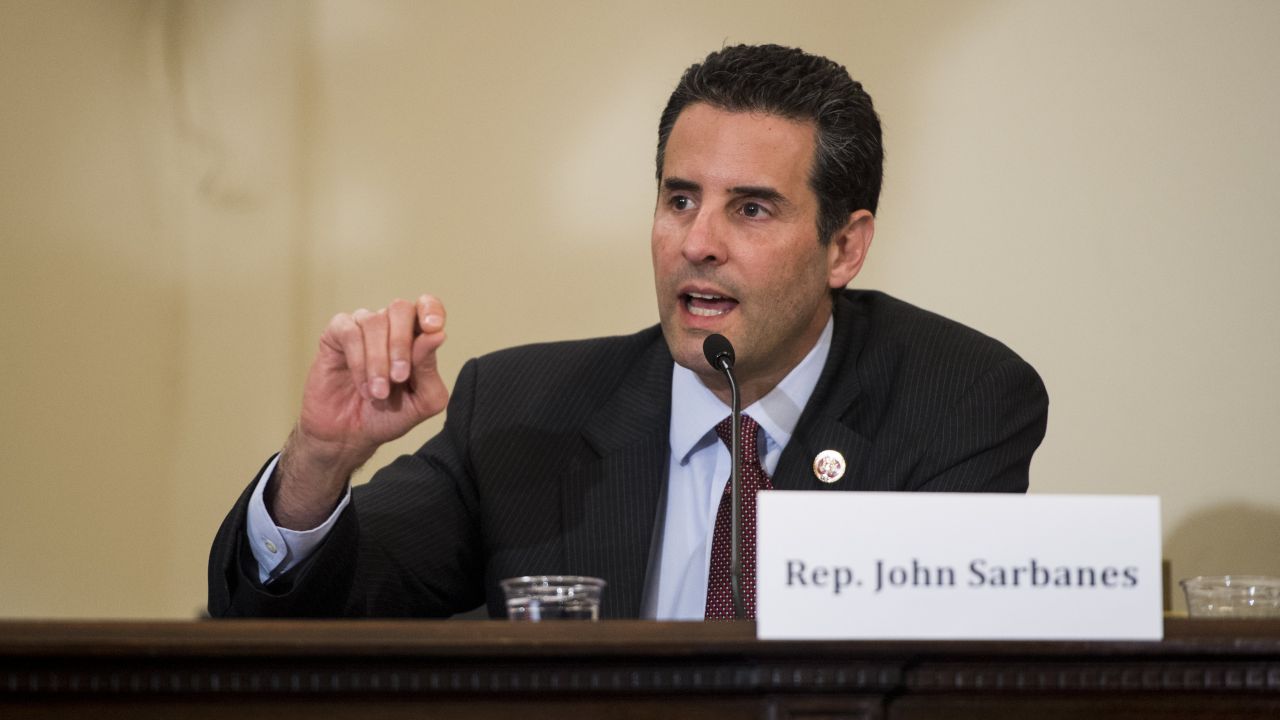
Rep. John Sarbanes (D-MD) has authored a bill aimed at enhancing the power of small donors to congressional campaigns. (Photo by Bill Clark/Getty Images)
A check of Rep. John Sarbanes’ recent press releases and newsletters shows the Maryland Democrat taking an active role on issues such as health care, gun safety, climate change and trade. But in his own mind, the most important item on his legislative agenda is the one on which he’s had the hardest time making any progress:
Campaign finance reform.
At a time when presidential candidates are turning away from public financing for their own campaigns because they don’t want to abide by limits on their spending and Congress has cut off public funding for political conventions, Sarbanes is insisting that “small donor-driven public financing” of campaigns is an idea whose time has come.
Unlike most other campaign finance reform efforts, which focus on limiting money from big donors, Sarbanes’ idea is to boost the amount coming from small donors. “It’s not the amount of money,” he reasons. “It’s where it comes from.”
His bill, which would create a 6-to-1 matching fund for small donations ($150 or less), is modeled after a highly praised New York City program that has seen candidates start venturing into areas of the city where they never used to go now that small-dollar fundraisers can be leveraged into bigger money.
Adopting this at the federal level, Sarbanes says, would give average Americans skin in the political game and liberate members of Congress from the undignified daily grind of begging special interests to finance campaigns that now cost multimillions of dollars. His bill has been endorsed by a broad coalition of labor, environmental, civil rights and government reform groups.
“This is not your grandparents’ reform effort,” Sarbanes declares. “This is new.”
Perhaps, but so far it is getting the same reception as your grandparents’ campaign finance reform efforts. Of the 161 co-sponsors on Sarbanes’ bill, only one — Walter Jones of North Carolina — is a member of the Republican Party that controls the House and, therefore, sets its agenda. The bill has gone precisely nowhere since Sarbanes introduced it on Jan. 21, 2015.
Nonetheless, Sarbanes insists he remains optimistic.
“If we don’t believe we can solve this,” he says, “then, in a sense, we’re giving up on American democracy.”
Sarbanes’ view of the current system couldn’t be more baleful. He is particularly critical of recent legislation that upped the limit on the amount individuals can give political parties. “Everything is being done to continue to move the parties, the candidates — i.e.., the government apparatus — to where it’s completely dependent on the big-money interests,” Sarbanes says. “And you get then what they pay for.”
The journey that turned the 54-year-old lawyer into a campaign finance crusader began, Sarbanes says, shortly after he was first elected to the House in 2006. He was still weeks away from being sworn in, when, the congressman recalls, “one of my staff members got a call from a lobbyist representing an industry with a big company in my district, and he said, ‘We’d love to put something together for you.’
“And it was going to be a fundraiser — a PAC fundraiser,” Sarbanes continues, “because I was now one of 435 members of Congress that this particular industry wanted to make sure they had a relationship with.”
Sarbanes demurred. “My first reaction was, ooof, I’m not sure I want to start down this path,” he says. So he began trying to create a path of his own, experimenting with ways to encourage small donors to participate in his campaign and becoming one of the few members of Congress who does not accept donations from political action committees, the usual conduits for industry money.
Sarbanes has the luxury of being able to take risks: He represents a reliably Democratic district that he has consistently won with at least 60 percent of the vote and hasn’t had a serious race since his first primary a decade ago. But he has taken advantage of that opportunity to become an outspoken advocate for reducing the influence of big money in politics, marching with campaign finance crusader Lawrence Lessig, taking his message to community meetings and to any newspaper editorial board that will listen.
It is hard to overstate his passion. In an interview, Sarbanes talked for nearly an hour about the need to “completely change the way we fund campaigns.” That’s more time than most of his colleagues would give to a reporter on any subject these days, in part because, as Sarbanes notes, members of Congress now operate under the “feeling that if I have a free minute in the day I ought to be making calls.” Otherwise known as dialing for dollars.
Earlier this week, Issue One, an advocacy group dedicated to campaign finance reform, released a report that revealed that since 2015, our elected officials in Washington — if they follow recommended fundraising guidelines from party officials — have spent over 832,000 hours on fundraising. That is equivalent to 94 years of eight-hour work days.
That takes all the fun out of being a member of Congress and is time spent not doing the job you were sent to Washington to do, Sarbanes argues. “It takes your independence from you. It takes your time from you. It takes your powers of concentration from you. It takes your credibility with the public from you. What do you got left?”
Like another sponsor of campaign finance legislation, Sen. Tom Udall (D-NM), Sarbanes is the son of a member of Congress whose memories of his father’s experience has deepened his sense that the system has gone off track. “This idea of ‘call time’ was completely alien to his generation,” Sarbanes said of his father, Paul Sarbanes, who retired from the Senate as his son was taking his seat in the House.
— Rep. John Sarbanes (D-MD)
Adding to Sarbanes’ sense of urgency: What he’s hearing from constituents. He’s unnerved by “how desperately cynical they’ve become.”
Sarbanes has coined a term for the mood he’s found: “knowingly irrational.” Otherwise known, in Sarbanes’ parlance, as “the Trump effect.”
“This anger in the public has become a new, sort of relentless force in our politics,” Sarbanes said. “It’s going to find its way to something. The challenge is, can we get it channelled to things that are restorative as opposed to just burning the place down?”
As lawmakers seek to avoid falling victim to that anger, Sarbanes believes it will build momentum for his legislation. It’s what keeps him evangelizing his bill to other members of Congress and the public. “There’s an opportunity. There’s a window here,” he says. “We don’t know when the window will open or for how long, but the goal is to be ready.”




